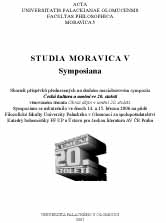Mýtus gorala a nemýtus horala v literatúre o Tatrách
Myth of Goral and Non-myth of Mountain Men in Literature of Mountains
Author(s): Katarína LaučíkováSubject(s): Literary Texts
Published by: Univerzita Palackého v Olomouci
Summary/Abstract: There have been similar life conditions on the both sides of the Tatry mountains till the beginning of the WW II. The people suffered under rough mountain weather, fought with rocky ground, even the socio-economic situation was very similar. Despite of it, conception of mountain people developed in two different ways. Both in the Polish and Slovak or Czech literatures they were strongly idealised. In the Polish social consciousness, the myth of courageous mountain dwellers, Góral, arose, while in the Slovak literature the myth of brave inhabitants of mountain village Važec and their ancestors Šoldovania, fell into oblivion. Why? How is it possible that mytization of Czech and Slovak artists did not help to create a Slovak version of the myth? The answers can be found in the past of the both nations as well as in various mentality. The Polish folk fought for their own state deliberated from occupants. Zakopane was, till the beginning of the WWI, the only place where Polish culture could survive illegally. Góral of Podhale was seen as a redeeming and revivalist element and the myth of góral mountain people developed. Till now it can be experienced in Podhale. In Važec Czech artists founded an artistic centre. People of Važec were considered to be unspoilt by social town relationships, were admired for braveness, simple way of life, etc. I think that the reason, that the myth was not created by Slovak literature, consist in era of Štúr movement, when strong centralisation started, and activities that weren’t taking part in Bratislava were ignored. Other reason it that Važec people of fi rst half of 20th century did not identified themselves with mountain inhabitants in general, lost pride of themselves, of their culture and habits. Absurd is that the meaning of word “Važťan” changed its original positive meaning to dishonesting one.
Journal: Studia Moravica. Acta Universitatis Palackianae Olomucensis Facultas Philosophica - Moravica
- Issue Year: 2007
- Issue No: 5
- Page Range: 225-229
- Page Count: 5
- Language: Czech

